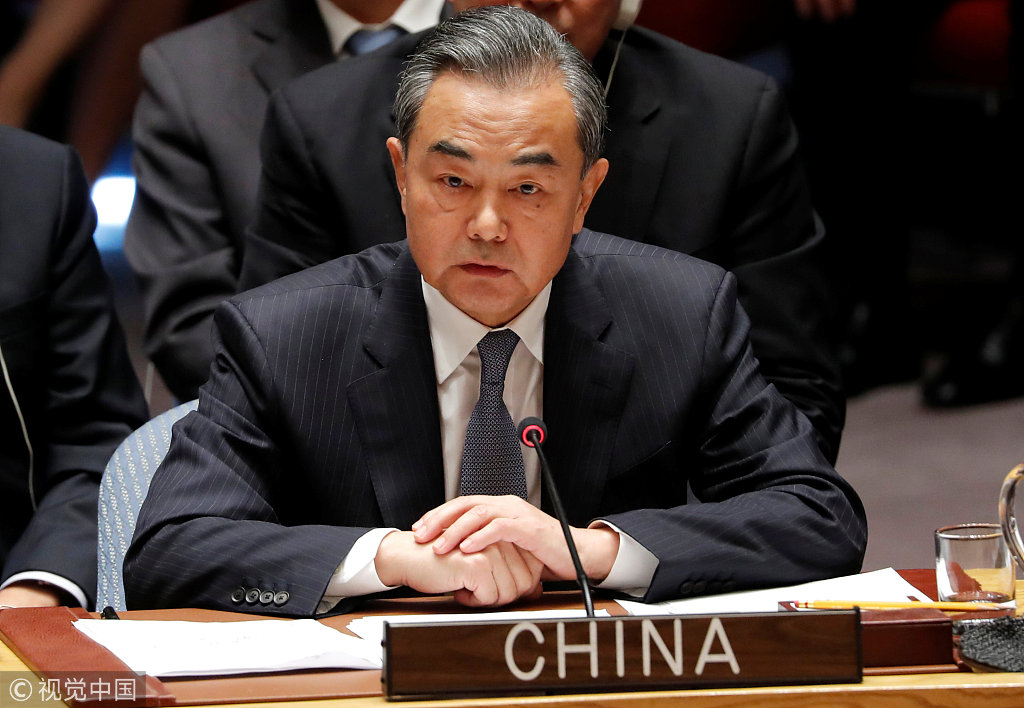FM: China adheres to UN Charter
By HONG XIAO/ZHANG RUINAN/WANG LINYAN | China Daily | Updated: 2018-09-28 07:17

China adheres to its solemn commitment to the purposes and principles of the United Nations Charter and resolutely safeguards the current international system with the UN as its core, State Councilor and Foreign Minister Wang Yi said at the Security Council meeting at the UN headquarters in New York on Wednesday.
The country will also earnestly fulfill its international responsibilities and obligations, Wang said.
The meeting of the 15 council members addressed ways that the body overseeing global peace and security can better enforce resolutions concerning the nonproliferation of weapons of mass destruction.
Wang said that given the complex challenges to international peace and security, China believes the council should perform its functions in a fair and just manner as mandated by the UN Charter, stick to political settlements as a preferred method and enhance unity to promote consensus and coordination.
On the nonproliferation issue, Wang said China advocates promoting the rule of law and consolidating and improving the global nonproliferation regime.
"We need to take multiple measures to implement the nonproliferation treaty in a balanced manner. And we need to boost international cooperation and enhance all countries' nonproliferation capabilities to achieve universal security."
Wang also said that since the beginning of this year, the situation on the Korean Peninsula has seen major progress, "and China has made unremitting efforts to make this happen".
Also on Wednesday, Wang urged the international community to implement the Paris Agreement and tackle the challenges of climate change as it has entered a critical stage.
"Implementing the Paris Agreement is a political commitment made by leaders of each country," Wang said at a high-level informal dialogue on climate change at the UN Headquarters in New York. "It's also an inescapable legal obligation and historical responsibility that corresponds with the trend of global development that each country should adhere to."
Wang said China firmly supports the collaboration of the international community in tackling the challenges of climate change.
Under the current circumstances, we must dutifully implement the Paris Agreement and adhere to the principle of common but differentiated responsibilities in concluding follow-up negotiations in the implementation of the Paris Agreement as scheduled, Wang said.
In order to successfully implement the Paris Agreement, developed countries need to make good on their pledge of annual contributions of $100 billion by 2020, provide assistance to developing countries through technology transfers and help them enhance their capabilities to deal with climate change and foster sustainable development, said Wang.
On the same day, Wang visited an exhibition, titled China in Action: Implementing the 2030 Agenda for Sustainable Development, presented by the Ministry of Foreign Affairs and organized by China's permanent mission to the UN.
Three years ago, while attending UN events marking the 70th anniversary of its founding, President Xi Jinping along with leaders from other countries, jointly adopted the UN 2030 development agenda, assuring a new era of the global cause of attention to sustainable development.
As the largest developing country in the world, China has integrated the implementation into its mid- to long-term national development strategies and formulated a national implementation plan.
China was among the first to release its national plan and progress report. Following the new development philosophy, China has been pursuing balanced progress in its efforts in economic, social and environmental fields.
On the sidelines of the UN meeting, Wang also met with German Foreign Minister Heiko Maas and DPRK Foreign Minister Ri Yongho.
Wang told his counterpart from the Democratic People's Republic of Korea that China is willing to work with the DPRK to fulfill the consensus reached by leaders. The two countries should have exchanges at various levels and strengthen strategic communication and cooperation.
Wang also met Christine Lagarde, managing director of the International Monetary Fund on the same day. Wang said China supports multilateralism, free trade and international rules.
























